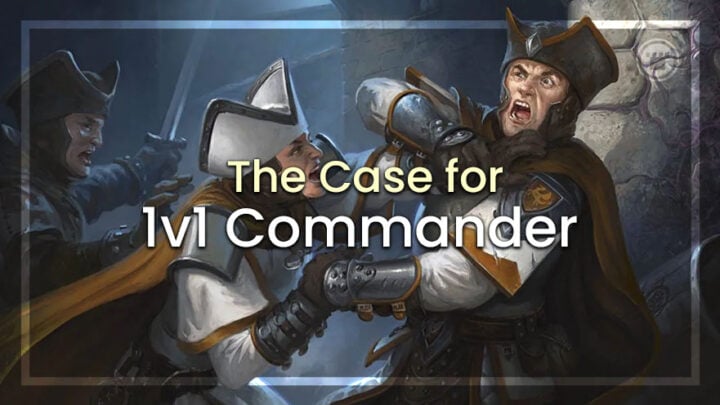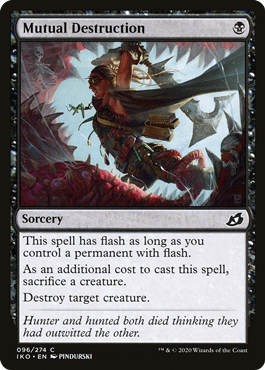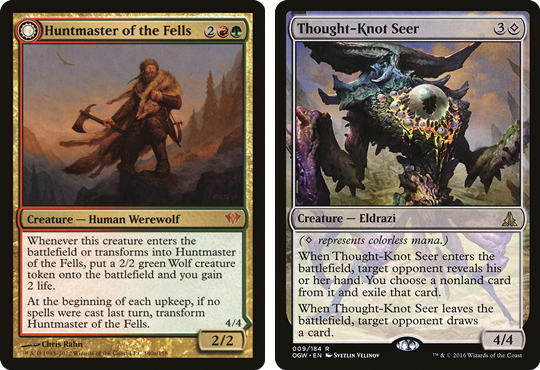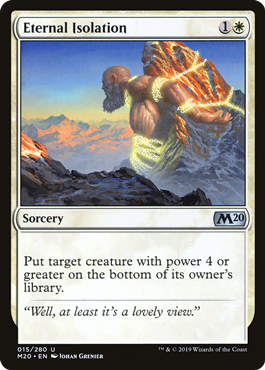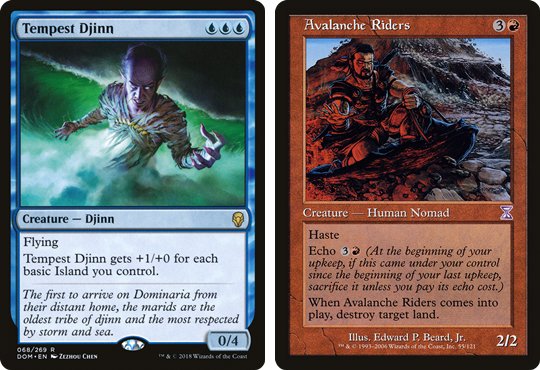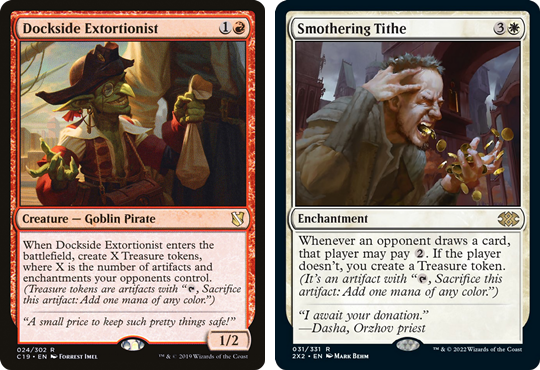For most of its first two decades, Magic was designed and marketed as a competitive discipline — a puzzle to solve with tournaments as its apex experience. However, while it may be hard to imagine now, Commander was once an upstart format which defied that default assumption about how and why people play Magic.
Elder Dragon Highlander (and later Commander) highlighted how people enjoyed playing Magic as a casual hobby, played without stakes, just for the fun of it. Removed from the pressures and structures of competition, the goal of the game shifted away from “maximizing your chance of winning” to “maximizing the fun had while playing.”
It did this, primarily, by switching from a 1v1 format to larger, multiplayer games. 1v1 games of Magic have this zero-sum feeling about them — you are responsible for anticipating and deflecting every opposing line of attack, and this requirement harshly limits which decks can survive in the metagame.
However, the mere existence of other players in Commander lessens the need for any one deck to defend itself. Any act of otherwise “free” aggression merits a second thought when it could leave you open to counterattack from the rest of the table. Along with higher life totals and the increased variance of singleton decks, these rules encourage slower-paced games with more elaborate, synergy-focused game plans, which is what led to the ideal of Commander gameplay most of the community still supports.
Years later, it seems like these Commander-centric gameplay assumptions are now themselves the default way to think about the game. For much of the community, Commander is the way to play fun, flavorful Magic — and changing any part of its formula borders on sacrilege. Yet, exploring a wide variety of play experiences is a key part of that formula; and I strongly believe that melding the original format of Magic with Commander has its own charms.
This is why you should be playing 1v1 Commander.
The little things count
Like Cube design, Commander deck building is about curating and showcasing your preferred Magic experience. I love building a forever-home for some favorite card or mechanic —but even in the forgiving metagame of casual Commander, some cards just don’t feel good. Funnily enough, those cards are the same ones which are often at the forefront of 1v1 formats.
Cards which trade one-to-one on resources with one opponent just set you back relative to the other players in Commander. Cards which generate finite, one-time value feel like a pointless half-measure when you’ll generally need an infinite engine to overpower a whole table at once.
Most significantly, any card or strategy which has to commit to aggression against one opponent at a time becomes a liability — which is by design. But what if you’re a fan of classic Red Deck Wins, Suicide Black or big green idiots, like Thragtusk? It feels paradoxical, but these days, Magic’s premiere casual format has very little place for a card that can’t threaten to explosively end a game on the spot.

This is not to criticize the imagination or taste of deck builders. It is already harder to feel involved in the game when you’re only taking 25% of the actions. Even the most efficient, “fair” value cards have their impact swallowed up by the mathematics of multiplayer — and that’s before you consider the bloated life totals any traditional aggro plan must contend with.
No, if you want to use Commander to celebrate the kind of Magic many of us have enjoyed in Standard or Modern formats past, it needs to be under the same resource dynamic they were balanced around in the first place — good old 1v1.
Even if you aren’t predisposed to nostalgia by these old Constructed bombs, the paradigm shift of 1v1 Commander seems like a perfect antidote to community concerns about an increasingly homogenous and strictly-defined multiplayer metagame.
Playing 1v1 doesn’t need to be a question of this format being more fun or more interesting than the other; it’s just nice to, sometimes, play a game where the narrow margins of card, mana and even life difference can swing the outcome. You spend more time as the active player and your every choice is more obviously influential on the ebb and flow of the game. It’s hard to imagine that being somehow antithetical to “fun” Magic!
A quick, easy (and legal) thrill
I could go into more detail about which cards and strategies are “unlocked” through 1v1 play, but I think the promise of a seachange is already the best gameplay-driven argument for giving it a try. Instead, I need to acknowledge the other really big reason to start dabbling in 1v1 Commander — it’s very easy to make games happen.
While some of us may be blessed with an active and committed Commander group, most of us need to rely on more sporadic participation to fill seats at our table. Having 1v1 Commander as a backup plan all but ensures you’ll get to play some Magic, even when it’s hard to get a full pod together. While not all my friends are as gung-ho about 1v1 Commander as I can be, we all agree it’s a lot more fun than playing 1v0.
1v1 Commander games also take much less real-time to play, even when both decks are relatively sluggish. If you’re slightly late to your group’s first game of the night — or you get knocked out very early — that’s a perfect opportunity to fit in some 1v1. You’ll probably get a whole extra game out of it before the rest of your main group is ready for the next round of action.
My colleague, Kristen, has written before about how useful 1v1 games can be as a testing tool for even multiplayer-focused Commander decks. You’re able to build up more live game reps much faster and you’ll have fewer external factors in gameplay which might stop you from clearly analyzing your deck’s performance. Honestly, the idea that your cards and your choices would be more influential on the flow of the game should be appealing, even if you aren’t trying to quickly evaluate a deck list.
In particular, I’ve found archetypes that try and dictate a particular pace of play — Ux tempo aggro or grindy resource-denial decks like Ponza — are difficult to play satisfyingly in multiplayer. Trying to keep on top of multiple opponents at once forces you away from anything resembling fair interaction, leaving you to rely on a narrow and unpopular band of “stax” effects that just grind all play to a halt. Contrary to the idea that 1v1 is necessarily a more hostile and zero-sum game, it allows players to adopt a more nuanced style of disruptive aggression instead of becoming a full-on prison deck.
It’s time to duel!
Between the smaller demands on other participants, lesser demands on time and simpler game states (another consequence of reduced player count), 1v1 Commander is a generally more accessible flavor of the format — and thus a valuable tool for the tricky task of inducting new Magic players into its mysteries. And while it’s hard to prove definitively that it’s also cheaper to build a 1v1 focused Commander deck, any gameplay shift away from requiring expensive, multiplayer ultra-staples seems promising on the financial front.
Two-Headed Giant is another alternative Commander format I’ve enjoyed, and in general I find myself leaning toward those shorter, more direct games quite often these days. Of course, this piece is not meant to incite division among Commander players or convert them to prioritizing 1v1 as the best/only way to play the format.
However, if your mission statement as a casual player is “play as many unique and enjoyable games as possible”, then at least having an open mind and a 1v1-oriented deck will lead to playing games you otherwise wouldn’t — both in how those games play out and the actual literal opportunity to play them. It’s just up to you to enjoy them.

Tom’s fate was sealed in 7th grade when his friend lent him a pile of commons to play Magic. He quickly picked up Boros and Orzhov decks in Ravnica block and has remained a staunch white magician ever since. A fan of all Constructed formats, he enjoys studying the history of the tournament meta. He specializes in midrange decks, especially Death & Taxes and Martyr Proc. One day, he swears he will win an MCQ with Evershrike. Ask him how at @AWanderingBard, or watch him stream Magic at twitch.tv/TheWanderingBard.

